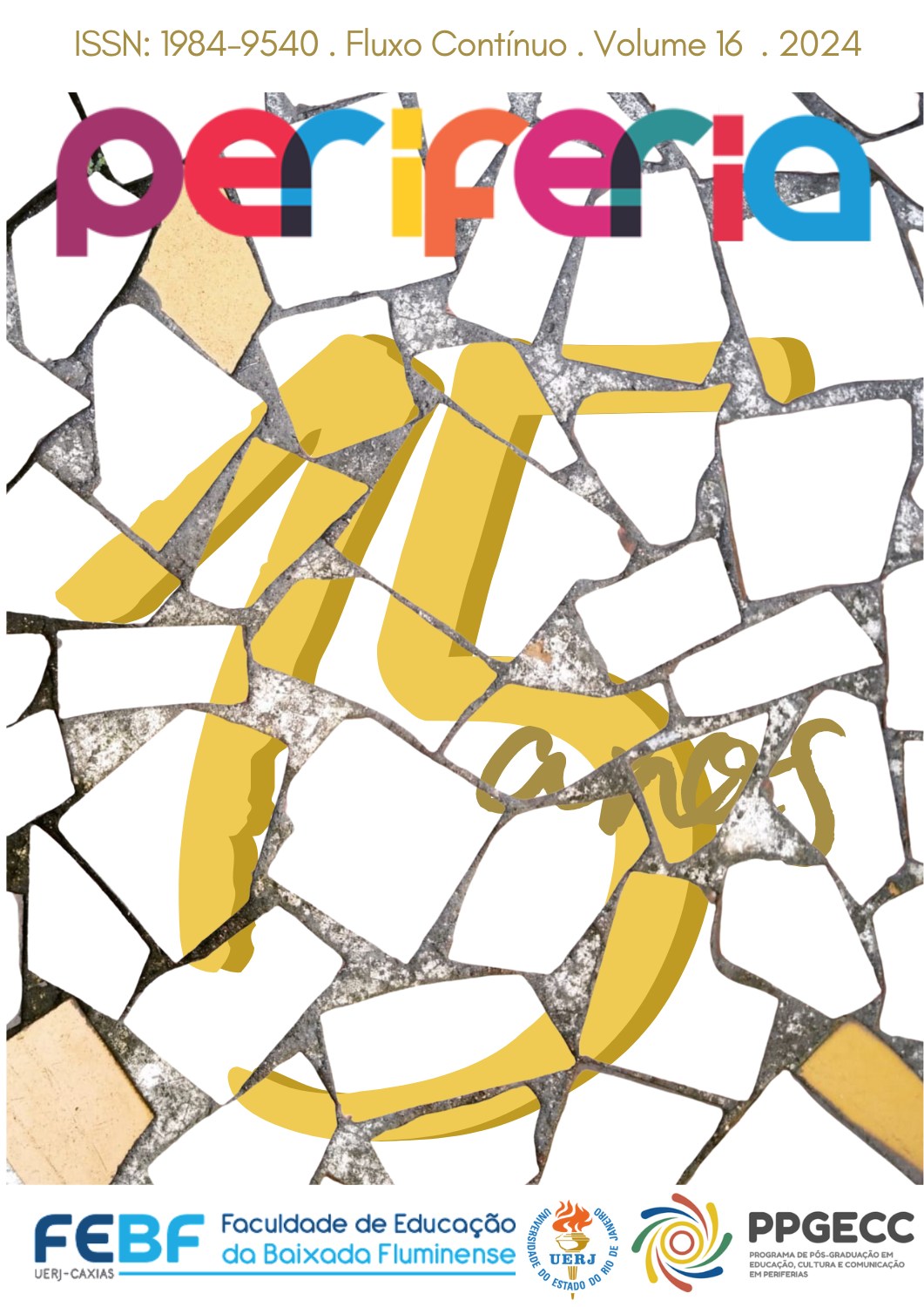SOLIDÃO, DIVISÃO SUBJETIVA E CANSAÇO:
trajetórias de mulheres pobres no ensino superior
DOI:
https://doi.org/10.12957/periferia.2024.76881Palavras-chave:
Mulher, Periferias urbanas; , Educação Superior; , Patriarcado; , Gênero;Resumo
Este trabalho é fruto do amadurecimento de pesquisas e reflexões oriundas de experiência docente em cursos de nível superior majoritariamente femininos situados em territórios periféricos urbanos do estado do Rio de Janeiro, em especial, na Baixada Fluminense. Optou-se pelo método do materialismo histórico para investigar quais as principais tensões enfrentadas por mulheres em suas trajetórias acadêmicas e para compreender como determinações sociais, políticas e econômicas influenciaram em suas escolhas e em sua permanência nestes cursos, tomando como base três eixos de discussão intimamente relacionados: territorialidade, educação superior e gênero. Trata-se de uma pesquisa empírica de caráter qualitativo e quantitativo cujos dados foram obtidos através de questionários e entrevistas semiestruturadas com estudantes mulheres de uma Instituição de Educação Superior em Duque de Caxias de três diferentes cursos e, com o recurso da triangulação, procurou-se cotejar os dados com a análise documental e bibliográfica. Os resultados da investigação apontam para a constatação que as estudantes, diante das condições objetivas e subjetivas na consecução de seus cursos de educação superior em Duque de Caxias, são submetidas a um franco processo de longa duração de alienação que redunda no enfrentamento contínuo de vivências complexas e não óbvias de grandes desafios de ordem política, subjetiva e material com o predomínio de diversas expressões de violência material e simbólica construída ao longo da história da região em consonância com processos maiores de nível nacional.
Referências
ALVES, José Cláudio Souza. Dos barões ao extermínio: uma história da violência na Baixada Fluminense. Duque de Caxias, APPH/ CLIO, 2003.
BHATTACHARYA, Tithi. O que é a Teoria da Reprodução Social?. In: Socialist Worker. Tradução: Maíra Mee Silva. Revisão técnica: Mariana Luppi. Publicado em: 10 de setembro de 2013 http://socialistworker.org/2013/09/10/what-issocial-reproduction-theory. Acesso em 09 set. 2020.
BRASIL. Ministério da Educação. INEP. Censo da Educação Superior 2010. Brasília, DF: INEP, 2010. Disponível em: http://portal.inep.gov.br/web/censo-da-educacao-superior. Acesso em: 25 jun. 2011.
CUNHA, Marina Silva da; VASCONCELOS, Marcos Roberto. Evolução da desigualdade na distribuição dos salários no Brasil. In: Economia Aplicada. Ribeirão Preto, v. 16, n. 1, p. 105-135, jan./mar. 2012. Disponível em: https://www.scielo.br/pdf/ecoa/v16n1/a05v16n1.pdf. Acesso em: Acesso em: 20 jul. 2019
ENGELS, Friedrich. A origem da família, da propriedade privada e do Estado. São Paulo: Expressão Popular, 2010.
FERNANDES, Florestan. A revolução burguesa no Brasil: ensaio de interpretação sociológica. 3. ed. Rio de Janeiro: Ed. Guanabara, 1987.
HIRATA, Helena; KERGOAT, Danièle. Novas configurações da divisão sexual do trabalho. In: Cadernos de Pesquisa. São Paulo, v. 37, n. 132, p. 595-609, set./dez. 2007. Disponível em: https://www.scielo.br/pdf/cp/v37n132/a0537132.pdf. Acesso em: 25 jun. 2011.
IANNI, O. A dialética da história. In: D’INCAO. M.A. (org). História ideal: ensaios sobre Caio Prado Jr. São Paulo: Unesp/ Brasiliense, 1989.
IASI, Mauro Luís. Ensaios sobre consciência e emancipação. São Paulo: Expressão Popular, 2011.
IBGE. Síntese de indicadores sociais: uma análise das condições de vida da população brasileira: 2010. Rio de Janeiro: IBGE, 2010a. Disponível em: https://biblioteca.ibge.gov.br/visualizacao/livros/liv45700.pdf. Acesso em: 25 nov. 2010.
IBGE. SIS 2010: Mulheres mais escolarizadas são mães mais tarde e têm menos filhos. Rio de Janeiro: IBGE, 2010b. Disponível em: https://censo2010.ibge.gov.br/noticias-censo?busca=1
&id=1&idnoticia=1717&t=sis-2010-mulheres-mais-escolarizadas-sao-maes-tarde-tem-menos
-filhos&view=noticia#:~:text=Ainda%20sobre%20mulheres%2C%20a%20SIS,%C3%A9%2
%25%20do%20deles. Acesso em: 25 nov. 2010.
IBGE. Indicadores sociais municipais 2010: incidência de pobreza é maior nos municípios de porte médio. Rio de Janeiro: IBGE, 2011. Disponível em: https://censo2010.ibge.gov.br/noti
cias-censo.html?view=noticia&id=1&idnoticia=2019&busca=1&t=indicadores-sociais-muni
cipais-2010-incidencia-pobreza-maior-municipios-porte-medio. Acesso em: 25 ago. 2012.
IBGE. Pesquisa Nacional por Amostra de Domicílios Contínua - Divulgação Especial Mulheres no Mercado de Trabalho. Brasília, 2018.
KOLLONTAI, Alexandra. O Comunismo e a Família. Tradução: Carlos Henrique. In: The Marxists Internet Archive, 1920. Disponível em: http://www.dominiopublico.gov.br/download/texto/ma000016.pdf . Acesso em 09 abr. 2021.
MARICATO, Ermínia. Metrópole, legislação e desigualdade. In: Estudos Avançados. São Paulo v.17 n.48, p. 151-167, maio/ago. 2003. Disponível em: https://www.scielo.br/pdf/ea/v17n48/
v17n48a13.pdf. Acesso em: 20 jul. 2019.
MARX, Karl. Para a crítica da economia política; Salário, preço e lucro; O rendimento e suas fontes. São Paulo: Abril Cultural, 1982.
MARX, Karl; ENGELS, Friedrich. A ideologia alemã: crítica da mais recente filosofia alemã em seus representantes Feuerbach, B. Bauer e Stirner, e do socialismo alemão em seus diferentes profetas (1845-1846). São Paulo: Boitempo, 2007.
MOURA, Clovis. Dialética radical do Brasil negro. São Paulo: Ed. Anita, 1994.
OXFAM. Tempo de cuidar: O trabalho de cuidado não remunerado e mal pago e a crise global da desigualdade. Tradução: Master Language Traduções e Interpretações Ltda., Brasília – Brasil. Reino Unido/ Brasília, 2020.
SANTOS, Milton; SILVEIRA, Maria Laura. O Brasil: território e sociedade no início do século XXI. Rio de Janeiro: Record, 2001.
UNFPA. Fecundidade e dinâmica da população brasileira. Fundo de População das Nações Unidas (UNFPA) no Brasil. Brasília, 2018.
WAISELFISZ, Julio Jacobo. Mapa da violência 2015: homicídio de mulheres no Brasil. Brasília, DF: FLACSO, 2015. Disponível em: https://www.mapadaviolencia.net.br/pdf2015
/MapaViolencia_2015_mulheres.pdf. Acesso em: 15 mar. 2021.
WILLEMAN, Estela M. Condições de acesso e permanência das mulheres da Periferia ao ensino superior: o caso de Duque de Caxias- RJ. 248 fls. Tese de Doutorado. Departamento de Educação e Ciências Humanas. PUC-Rio, Rio de Janeiro, 2013.
Downloads
Publicado
Como Citar
Edição
Seção
Licença
Autores que publicam nesta revista concordam com os seguintes termos:- Autores mantém os direitos autorais e concedem à revista o direito de primeira publicação, com o trabalho simultaneamente licenciado sob a Creative Commons Attribution License que permitindo o compartilhamento do trabalho com reconhecimento da autoria do trabalho e publicação inicial nesta revista.
- Autores têm autorização para assumir contratos adicionais separadamente, para distribuição não-exclusiva da versão do trabalho publicada nesta revista (ex.: publicar em repositório institucional ou como capítulo de livro), com reconhecimento de autoria e publicação inicial nesta revista.
- Autores têm permissão e são estimulados a publicar e distribuir seu trabalho online (ex.: em repositórios institucionais ou na sua página pessoal) a qualquer ponto antes ou durante o processo editorial, já que isso pode gerar alterações produtivas, bem como aumentar o impacto e a citação do trabalho publicado (Veja O Efeito do Acesso Livre).







